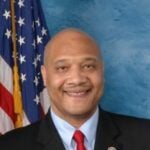Black Americans have made significant contributions to the United States economy. And yet, a significant wealth gap still persists.
The wealth of the richest 400 Americans is approximately equal to that of 43 million Black Americans.
Black Americans, even when achieving the same education levels as their white counterparts, have difficulty accessing generational wealth.
April marked Financial Literacy Month. As the month reached a close, I re-introduced the Young Americans Financial Literacy Act to improve young people’s ability to make informed and effective financial decisions that will strengthen financial literacy.
Our economy still faces challenges in the wake of COVID-19, but thanks to a Democrat-led Congress and President Biden, we are on our way back up. Job creation is up, unemployment is down, significantly. Black unemployment reached a record low in March.
But across the US population, unbanked rates – meaning no one in the household has a checking account – are higher among Black households, as well as lower-income households, less-educated households, Hispanic households, working-age households with a disability, and single-mother households. According to a 2021 study, among households with income between $30,000 and $50,000, 8.0 percent of Black households and 8.4 percent of Hispanic households were unbanked, compared with 1.7 percent of White households.
Without more effective economic education, our community will fall behind unless we increase access to the tools necessary to achieve and maintain wealth. We must ensure that no community gets left behind – and financial literacy is key.
While 92 percent of K-12 teachers believe financial education should be taught in schools, only 12 percent of teachers are able to do so. My bill focuses on young people between the ages of 8-24 so they can start their financial futures in a better state – regardless of race, gender, or income.
Financial literacy is especially key for young people as they receive their first paychecks and prepare to make long-lasting decisions, like taking out student loans and credit cards.
I’ll continue to advocate for student loan reform to ensure young people don’t need to go into massive amounts of debt just to complete their education. But even with student loan reform, making the transition to financial independence is challenging. Decisions made early in life can have impacts for decades to come.
Without financial literacy, individuals and families are more susceptible to fraud, scams, and predatory lending practices. They also have decreased credit use and higher interest rates, and lack savings and investing strategies that help grow overall financial security.
Financial literacy helps individuals and families thrive, but it also helps our entire economy as a whole as we have more individuals actively participating in a positive economy, activity pursuing home ownership, and acquiring wealth, and not racking up debilitating debt.
So, what’s the solution? My bill has a multi-prong approach and will:
- Establish a grant program in the Bureau of Consumer Financial Protection to develop and implement financial literacy programs for young people ages eight to twenty-four;
- Incentivize the development of partnerships between institutions of higher education, local educational agencies, non-profit organizations, and financial institutions to create programs aimed at young Americans in different phases of their life;
- Ensure the development of evidence-based instructional material that is geared towards targeted groups and addresses unique life situations, including bankruptcy, foreclosure, student loans, credit card misuse; and
- Conduct ongoing assessment and accountability of the program over the short- and long-term to ensure that grant money achieves the greatest impact.
With the persistent impact of centuries of systematic oppression, the racial wealth gap will not close without proactive measures to open access to financial opportunities. With holistic changes at every level, step by step, we can begin to shrink that gap until one day it disappears altogether.










